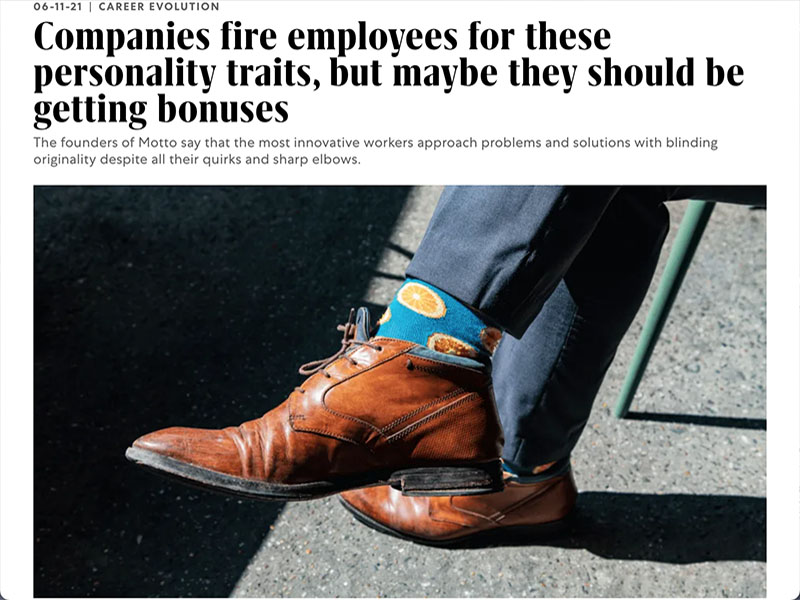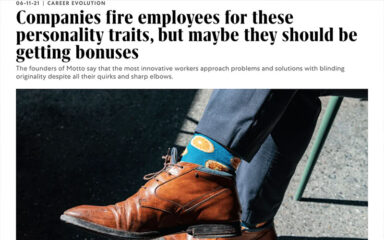
As someone with a deep and personal interest in neurodiversity in the advertising industry, I was stoked to see an article by the founders of Motto about the value of theoretically disruptive personal traits. “Companies fire employees for these personality traits, but maybe they should be getting bonuses.” (Hell yeah. I love a bonus.) It’s such an important topic to discuss — many neurodivergent people struggle to find gainful employment because of some of the tendencies discussed in the article, and it’s great to see a different, more positive spin on them. Obviously, one doesn’t have to be straight-up neurodivergent to exhibit some of said tendencies, but it doesn’t hurt.
This article started so well.
I loved that so many of the traits identified as common to “Rare Breeds” are addressed as assets, especially since many of them are common fodder for workplace gender discrimination — when behavior that might be characterized as confidence in a man is seen as audacity in a woman, or a man who’s seen as passionate could be contrasted with a woman who’s seen as emotional, pointing out that being audacious and emotional aren’t that bad anyway is a good thing. And I especially especially loved the acknowledgement that some of the “Rare Breed” traits that are already celebrated in the Steve Jobses and Elon Musks of the world are often criticized in non-white non-men. Hell yes, Motto people, look at the world objectively. BRING IT, MOTTO. Put it in my veins.
And then Motto’s love letter to the differently minded turns into Mr. Darcy’s first proposal.
It sounded like a compliment, and yet my face stings from the back of your hand.
You must allow me to tell you how ardently I admire and love your work. In declaring myself thus I’m fully aware that I will be going expressly against the wishes of my managers, my colleagues, and, I hardly need add, my own better judgment.
“I’d start with this — does somebody bring special talents? What does it take to tap those talents if they’re a nerd or they have Asperger’s or they’re an antisocial person, or they don’t bathe and won’t bathe? They may well be presenting some talent, so start with the talent. That’s the most important thing organizationally: ‘This person brings something to us.’”
“Take the person who is talented, nerdy, difficult, smelly, oppositional, disruptive at meetings,” [Carnegie Mellon professor of Organizational Behavior and Public Policy Dr. Denise] Rousseau continues. “But boy, when they ask a question, you go, ‘Wow.’ We need those people. The idea is that we channel them, but we protect the rest of the organization from their more disruptive or antisocial tendencies. There are entire departments in tech companies made up of people who are high-functioning Asperger’s, and they’ve got often somebody from HR or a local line manager who helps them relate and represents their work to the rest of the organization. Think channel. Think broker. You’re creating an island of misfit toys.”
Dr. Denise Rousseau, “Companies fire employees for these personality traits, but maybe they should be getting bonuses“
YES. Please talk to your employee who won’t bathe. Do it politely and discreetly, of course, but I have issues abut smells, and someone else’s poor hygiene can be a challenge for me. And thank you for talking to the inveterate mansplainer — I have enough trouble getting an idea out sometimes that I don’t need someone interrupting me in the guise of trying to “help.” And —
OH. Oh, you were talking about me.
Thanks, I hate it.
Okay, so, just to get this out of the way: High-functioning and Asperger’s (and especially being Asperger’s) aren’t a thing in the neurodiversity discussion anymore. Update your lexicon, like, eight years ago.
Moving on:
Neurodivergent people have a tough enough time of it already. Pop-culture depictions tend to skew in the direction of the human calculator or the flat-affected android a la Dr. Whatshisname in Robot Doctor Learns to Feel. I can’t count the number of times I’ve gotten But I’m Assburgers as an excuse for not accepting a clear, explicitly expressed message that I’m not interested. And recently, we even got autism as an excuse for storming the Capitol dressed like a buffalo (trigger warning for some of the most disgusting ableist slurs at that link), which somehow, in my 40 years as an autistic woman, I’ve managed to never do. We’ve been thrown under the bus so many times, we’re wearing permanent tire tracks.
So being equated with some antisocial, oppositional, disruptive, unbathed misfit from whom my organization needs to be protected? Yeah. That one stung a little. (I’ll also take umbrage on behalf of nerds. In what world is an obsessive love of Star Trek equivalent to poor hygiene?)
Order of protection
I’ll be the first to acknowledge that neurodivergent — and, hell, just “different” — people can be challenging to an organization. I know I present challenges. I tend to have a lot more questions than my colleagues, because they’re generally able to intuit stuff I can only figure out with effort. I’m really bad on the spot, because my processors aren’t that quick and I frequently have to read through my notes and give the hamsters a chance to run around a little before I can come up with a good answer. I’m not great at policing my facial expressions, and I have a tendency to say things I don’t realize were the wrong thing until I’m already getting clear signals from everyone around me. I struggle with upheaval, so what makes other people grit their teeth, cuss, and get back to work makes me grit my teeth, sniffle, go into the bathroom, decompensate, recompensate, cuss, and get back to work.
I know I’m challenging. I feel bad about it all the time. When I have to ask a follow-up to the follow-up of my follow-up, I feel bad about it. When I stumble in a meeting and I know I look inattentive but really my brain just doesn’t work that fast, I feel bad about it. When a project changes for the third time in as many meetings and my brain goes TILT and I lose fifteen minutes of my day to a panic attack, I thank God for camera-off Zoom meetings, because I do not de-puff quickly after I’ve been crying, and camera-on would mean looking to my colleagues like a grown-ass woman who had a fit when things got difficult.
So yes, I fully and openly recognize the need to insulate an organization from the less-beneficial tendencies associated with my personal situation, or those of anyone similar to me. It’s not pleasant to acknowledge, but I’m not one to kid myself. I want my organization to thrive, and I’m up for them doing what it takes to do so. Hell, I certainly do what I can to insulate my organization. Any person, neurodivergent or not, who isn’t at least willing to make a reasonable, healthy degree of effort is kind of an asshole, and if you’ve hired an asshole, you’ve got bigger problems than “Rare Breed” personality traits.
But how about protecting your neurodivergent employees from the tendencies of your organization?
What’s the matter with misfits?
How about getting your project management ish together, so an employee who relies on consistency and accurate information can actually get it? How about managing your office environment, so an employee who needs a little peace and quiet can find it? How about offering accommodations for employees who, for instance, provide their brilliance via a 72-hour genius bender and might need half a day off? How about establishing an office culture where authority isn’t sacrosanct and challenging it is actually seen as a good thing?
How about raising awareness of neurodiversity within your office, so everyone can learn to accept and relate to each other in positive ways, instead of creating a freaking “island of misfit toys” with a translator to go between the talented weirdos and the normies?
(It’s only fair to acknowledge that this rather offensive messaging doesn’t come directly from the authors of the article, but from an actual, honest-to-dog, Ph.D.’d professor who is, ostensibly, teaching her students to see neurodivergent and otherwise “different” employees as misfits to be isolated for the good of the organization. But the authors here chose to include it, endorsed it, might even incorporate it into the management of their own office. And that makes me really sad.)
Off the island
As you might have gathered from context clues, I’ve recently picked up a full-time, in-house job on top of my freelance work. (Rates still reasonable; continue to inquire within.) It’s honestly nothing I ever intended to do ever, but when you get the kind of proposal I got, you just can’t turn it down. Management was aware of my situation (of all my blog posts, this one was the last one I expected to help land me work), and they were willing to give me the support I need to function effectively and happily, because they’d seen my work, and I bewitched them body and soul, and they loved me, they loved me, they loved me.
(I paraphrase.)
My new people would have to be the ones to comment on my performance, of course, but unless they’ve been blatantly and needlessly lying about my value to the company, all indication is that I’m doing well. And regardless of my own concerns about myself, they’ve never made me feel like I’m a burden, or anything they need protecting from. Me, my tendencies, or anything else. That’s how you show you value your “Rare Breeds.”
While I’m monologuing, something in the “nothing about us without us” area: This article was clearly published without the consideration that the talented weirdos who need to be pumped for their creativity and then sequestered on an island where they can’t hurt anyone might also read Fast Company and might not be entirely pleased with their depiction. Neurodivergent and simply “different” people have heard our entire lives that we’re weird and don’t belong with everyone else. Reading it in an article that purports to be supportive of us kind of twists the knife a little.
Also, at the risk of belaboring the point, for the love of God, if one of your employees doesn’t bathe, gently advise them to freaking bathe. They might have no idea they’re grossing out their colleagues and would appreciate a delicate, nonpublic reminder.
Nobody wants to be stinky at the office.

